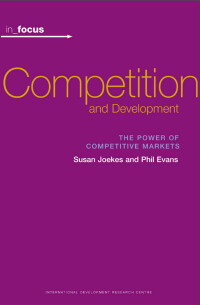Economic and Business Development
-
Agricultural Value Chain Finance
Agriculture remains an important means of alleviating poverty, but shortage of finance can constrain its development. At the same time, agriculture is evolving towards a global system requiring high-quality, competitive products, and is organized in value chains which often exclude smallholders. Val...
-
What Works for the Poorest?
David Lawson, David Hulme, Imran Matin, Karen Moore
Poverty reduction has become the central goal of development policies over the last decade but there is a growing realization that the poorest people rarely benefit from poverty reduction programmes. Microfinance programmes can help poor people improve their lives but generally such programmes do no...
-
Speaking Out
Jo Rowlands, Nikki van der Gaag
Many poor people around the world are denied the opportunity to have their say. Politics generally works well for those in power, but those in poverty are often excluded from forums that directly affect their welfare and so are unable to hold decision-makers to account. Speaking Out describes differ...
-
The Poor and their Money
The Microfinance revolution is usually considered to have been led by the NGOs, donor agencies, and more recently banks who offer poor people financial services. But what can we learn from the ways that poor people already manage their money? What are the essential elements that they prize so much t...
-
Microfinance Self-Help Groups in India
Self-Help Groups (SHGs), a means of reaching rural women with savings and credit services, have taken off dramatically in India, where an estimated 25 million women are members. Their benefits are social as well as economic: SHGs encourage women to become active in village affairs, or take action ag...
-
Fuelling Economic Growth
The private sector is playing an increasingly important role in the funding of scientific research. As public sector research declines in the countries of the north and the south, research and development carried out by the private sector becomes more important for innovations that have economic pot...
-
Development, Divinity and Dharma
Malcolm Harper, DSK Rao, Ashis Kumar Sahu
Faith-based institutions are getting involved in economic development programmes, including microfinance, and many foreign donors are looking to religious organizations for new ways to reach the poorest people. This book considers the work of a number of these, of different faiths, and asks what is...
-
Expanding the Frontier in Rural Finance
Despite significant innovations in rural microfinance over the years, millions of people around the world still do not have access to financial services. Can linkages and strategic alliances between formal and informal financial institutions and private firms help resolve this problem? Drawing on 12...
-
Competition and Development
Competition and Development: The Power of Competitive Markets
-
Conversations with Practitioners
This is a collection of interviews with leading microfinance practitioners and specialists discussing the challenges facing microfinance institutions as they attempt to become more market-oriented, competitive and sustainable. It was written by a recognised leader in the field on the basis of extens...










